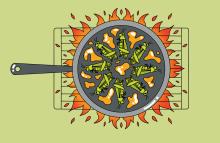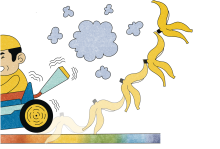Humor

Given my preferential option for the poor, would it seem kinda hypocritical of me to pay a billionaire for a blue check mark?

ARTIFICIAL INTELLIGENCE HAS been raising a lot of eyebrows lately and, to my surprise, it has nothing to do with “guar gum” or Red Dye No. 40, the ingredients that make most things artificial. (Is somebody working on organic, free-range intelligence?) The main concern — other than a complete takeover by machines — seems to be that AI could write term papers for high school kids. I’m sympathetic to that concern, but from the students’ perspective. If I’d had that kind of help in school, I would have earned more than just the one A in typing class.
Most reporting has been about ChatGPT and Bing, Microsoft’s AI search engine, which still has some bugs, including combative responses. But who cares about that when you just want to find good airfares?

TODAY I WANTED to take the time to spotlight a recipe from my forthcoming book, Appetizers to Prepare the Way: Not the Main Course, but Still Pretty Cool.
Now, Honey-Crisped Locusts are delightful to eat year-round (God knows I do!), but they are most satisfying on an early spring day. Just imagine it: You ask some followers friends to meet you by the river. The air is still too cold for a jaunty baptismal dip, but it’s perfect for a picnic. You lay out your camel-hair picnic blanket, which took you two years to knit, and invite your friends to sit down. Then you reach into your (also) camel-hair knapsack, and one of your friends says, “Heck yeah! Did you bring us some bread and wine?” And you say, “Never! I’ve brought something better!” You hand each of them three honey-soaked locusts. Undoubtedly overcome with joy, your friends are at a loss for words, so speechless that they don’t talk to you for the rest of the picnic. The perfect day.

“I’m getting into you / Because you got to me in a way words can’t describe.”
WHEN I FIRST heard these lyrics in the early 2000s, I was smitten. I pressed the soft foam of my headphones against my ears to better hear the lyrics of Relient K. My crush, who we’ll call “Jamie,” had chosen this song as track one on the mix CD he burned for me. Near the top of the CD, he sharpied the name of the song: “GETTING INTO YOU” (emphasis Jamie’s).
Surely this was confirmation that Jamie didn’t just like me as a classmate — he was, as Paramore sang it best, into me. But I was naïve; I was mainline; I interpreted Relient K’s lyrics romantically when I should have approached them hermeneutically. Reader, I was so Presbyterian Church (USA) that I had never heard of the PCA. I knew there was an old rugged cross on a hill, but I’d never heard of Hillsong.

I RECENTLY SUFFERED a home invasion by one of the Four Rodents of the Apocalypse, which are mice, rats, squirrels, and something called “roof rats” (rats tired of the climate-change-induced uptick in flooding of sewer-front properties). I was blessed with the deceptively cutest of these four: Squirrels. In. My. Ceiling.
(Reader, I want to be clear that “squirrels in my ceiling” is not a reference to my scattered thoughts but to literal bushy-tailed rodents doing tumbling runs in the crawl space above a bedroom.)
Squirrels strike a rare balance: They are both adorable and terrifying (like some toddlers I know). One day they’re hanging upside down outside the window to say hello or sitting and nibbling on a nut held just so in their wittle paws, so winsome! The next, a squirrel appears out of nowhere as I enjoy a sunny day on my front stoop, its eyes locked on mine. It skitters forward, then freezes. Forward and freeze, forward and freeze, like a glitchy squirrel robot. It is undeterred by “Shoo!” or “What do you want from meeeee?” Staring blankly, it just keeps coming — for the peanuts it imagines are in my pockets? For my soul? Or are there now flesh-eating squirrels? I run inside and lock the door.

DECEMBER IS A stressful time for fundraisers, as a significant percentage of most nonprofits’ annual revenue comes in during the holiday season. We made a mistake this month when we asked Beth, who does much of Sojourners’ online fundraising, to write a humor column for this issue. Instead of a humor column, she sent us the following, in an envelope with a return address of “a cave in the woods; do not look for me.” We hope she’s doing okay. — The Editors
Dear Potential Supporter,
Now more than ever. This holiday season. In this moment, this urgent time, the most crucial of moments that all of us are in, right now. (Yes, you too.) Now — today — more than ever — Sojourners needs your year-end donation.
Did you know that the average American hears the phrase “now more than ever” 500 times a day? Did you know that all other organizations who use the phrase “now more than ever” are copying us, and we used it first? (Did you know that I, a fundraising professional hiding inside a cave, am both deeply normal and a trustworthy source of information?)

IT'S HARD TO tell whether Southern California, where I live, holds more nondenominational churches or neighborhood gyms. Sometimes, it’s even hard to tell whether a facility is a nondenominational church or a fitness center. At both the church and the gym, you are likely to encounter over-enthusiastic greeters in the foyer. And as you proceed farther into either type of institution, you’ll begin to hear vaguely inspiring pop-rock music. (Are the lyrics love songs to your boyfriend, to Jesus, or to an unrealistic projection of your future self? It’s hard to say — that’s the genius of it.) As you arrive in the back of these buildings, you’ll see a shared main attraction: a vivacious man in expensive sneakers urging you to strive for greatness, push through the pain, and please, please, please bring your friend with you next time. The websites of both the gyms and the churches will promise you a “no judgment zone” where “all are welcome.” Pretty good chance both are lying to you. But there’s free child care!
The biggest similarity of all between nondenom churches and neighborhood gyms? Their names: They will usually be one word long: Arise, Equinox, Crossroads. Likely, the names could also serve as code words for MDMA or WWE wrestlers’ stage names: The Rock, The Renegade, Saddleback.
Below are the names of gyms and churches. See if you can rise to the challenge, push through the pain, and determine which names belong to churches and which ones belong to gyms that I can’t afford.

What gives this smooth-faced woman the right to teach me something from the Bible? Fear not! I have a single hair sprouting from my chin.

READERS, I AM here to tell you about My Mindfulness Journey, but not in an annoying way, guaranteed or your money back. (Please keep reading. It’ll be different this time.)
But, before we get to mindfulness—aware of Carl Sagan’s comment, “If you wish to make an apple pie from scratch, you must first invent the universe”—we will need to invent my brain, or at least take some major psychological detours. Which is appropriate, since ADHD is all about detours.
Oh, wait. Got ahead of myself there. Let’s start at the beginning.
My 2020 experience was a typical one, in that I spent 100 percent of it in my home and/or in untenable personal and professional situations. Switching to working from home utterly destroyed my routines and support systems. The accompanying collapse of my productivity, mood, and mental health prompted my therapist to ask if I’d ever considered that I might have Attention-Deficit/Hyperactive Disorder, or ADHD.
ADHD is a neurodevelopmental disorder that affects attention regulation, executive function, working memory, and a host of other issues—seemingly designed with the express purpose of embarrassing me in front of my boss.
In the months following my diagnosis, I analyzed my habits with the eye of a quality control inspector, dumbstruck by the breadth and scope of this particular unit’s malfunctioning. “How have I survived all this time?” I wondered almost daily. “And surely one of these ‘normal’ people could give me a scrap of their extra dopamine? For a good cause?”
At the same time, I realized: You know what would be a great way to help me learn to live with an overactive and unpredictable brain? Mindfulness.

IN HER RECENT article “Praying the Imprecatory Psalms Is an Act of Nonviolence,” Liz Cooledge Jenkins explains that the imprecatory psalms of the Hebrew Bible “demand that God exact judgment against evildoers.” These psalms are particularly ... colorful. Take Psalm 35, for example:
Let ruin come on them unawares.
And let the net that they hid ensnare them;
let them fall in it—to their ruin.
In comparison to other imprecatory psalms, the above is fairly sanitized. Often in these verses, the psalmist calls for teeth-breaking, infant murder, and widow-making. To be honest, I’ve struggled to read them. My privileged life has left me with few enemies worth cursing and scant violence to avenge. But I realize that many people of faith—especially those living under oppression’s boot—may find a certain catharsis in these psalms as they imagine God judging the truly hurtful people and powers of the world. “In praying these psalms,” writes Cooledge Jenkins, “we process our rage and give our violent impulses over to God.” One problem, though: The curses in the imprecatory psalms are a bit dated and unrelatable. I’ve gone to the trouble of updating them for modernity. For your consideration:
Psalm 1
O Lord, may the iPhone of the slumlord in Crown Heights fall into a toilet of his own urine. May a single AirPod follow quickly behind.

LEST YOU THINK labor organizing started with the most recent Amazon or Starbucks unionization, let’s look at this ancient document found submerged near the island of Patmos. The document appears to be from another group of mammals negotiating what is believed to be the first collective bargaining agreement.
Letter of Demands
From: The International Animals Union
To: Noah
Subject: Excessive Rainfall
Whereas the earth has become corrupt and filled with violence and
Whereas God has decided to destroy all living creatures and
Whereas Noah is required to build an ark and bring a pair of every kind of animal on the ark, therefore
Noah and the International Animals Union agree that the previous agreement has been terminated and replaced by the following agreement beginning on the 17th day of the second month and ending after 40 days and 40 nights, unless it rains the whole time.
I. Breaks
All animals shall be given 15-minute breaks for naps, whenever they feel like it. (We’re assuming any human over 600 years old on the ark will likewise be taking multiple naps per day.) Breaks can be used for whatever animals want, including but not limited to gathering around the water trough to talk about the change in rain patterns for the day.
II. Schedule Assignments
All animals shall be given their work assignments a week in advance via pigeon post delivered on papyrus. On holidays, work assignments shall be delivered on parchment. Ravens and doves are available for special work at the end of the cruise.
III. 40-Hour Work Week

ONCE I HAD a dream that I was walking along the beach with my Lord. I felt self-conscious about wearing a two-piece swimsuit, but I didn’t know the Lord was going to be at Rehoboth Beach during spring break.
God said, Don’t worry about it, Jenna. Purity culture is so 2008.
Suddenly, scenes of my life flashed before me along the shoreline. I looked back at the footprints in the sand. In most scenes, there were two sets of footprints: Mine and God’s. God is a size 8.5 and has high arches, in case you were wondering. But then I noticed something troubling. At many of the hard times in my life, there was only one set of footprints.
When I needed you the most, why did you leave me? I asked God, with more sass than I’d like to admit. God whispered something in return, but I couldn’t hear the words. It’s really loud at the beach, and there was a sand volleyball game nearby. So then God yelled, I never left you! When you saw only one set of footprints, that was when I carried you.
I was so relieved. Sorry for the mix-up, I said to God. I also wear size 8.5, so I was confused.
But then I noticed something even more troubling.

Date: Sunday, May 17, 2122
To: allchurch @gracechurch.metaverse
From: staff @gracechurch.metaverse
Subject: Children singing in church
RECENTLY OUR STAFF has received many questions about why we do not permit children to sing during services. We understand that this is a contentious issue, and we want to do our best to respond to these concerns. Before we begin, it must be made clear that on all matters of doctrine, we look to the sacred All-Church PDF sent out by our founding elders in the year 2022, almost 100 years ago, which clearly defined our church policy.
To begin, let us look at section 4.A of the holy PDF. It states: “Please do not allow your children to sing during the sermon, especially if it’s a shouted rendition of ‘We Don’t Talk About Bruno.’” Given this language from the foundational All-Church PDF, the prescribed ban on singing seems clear (although we’re not quite sure who Bruno was or why people weren’t supposed to talk about him). Some of you have noted that this directive may have been a response to disruptions during services. While it is true that we have found several cellphone videos from 2022 of children standing up to loudly sing in the middle of the Eucharist, there is simply no way to know if section 4.A of the PDF was written in response to that.

ALLOW ME TO introduce myself: I’m IKEA, an expert in DIY construction and deconstruction, here to explain a recent religious phenomenon. According to a 2021 Relevant magazine article, Christianity is in “the age of deconstruction.” “Through deconstruction,” explains writer Kurtis Vanderpool, “we are able to find the good and the helpful parts of our faith upbringing, while reshaping or throwing out the unhelpful.” But there is a problem! While the exvangelicals on Twitter are obsessed with deconstruction, “most people you will find in church are uncomfortable with deconstruction,” says Vanderpool.
You may be thinking, “Is an enormous warehouse full of good-enough furniture really equipped to explain a sensitive theological process? No offense, IKEA, but did you even go to seminary?” No, I didn’t. But nondenominational churches often pay me thousands of dollars to host massive lock-ins and I overhear A LOT of really bad theology as youth pastors, groggy chaperones, and sugar-faced youth groups play hide-and-seek in my showrooms. (I’m pretty sure I didn’t dream this.)

AS MORE AND MORE more of us who are still working remotely receive the COVID-19 booster, and as more effective treatments are developed and omicron fades into distant memory (one can always hope), the threat of returning to “normal life”—offices, restaurants, bars—looms on the horizon. White-collar workers across the nation are looking upon their professional shoes and slacks with fear and dread. Are we as a country capable of abandoning sweatpants, after all they’ve done for us?
We have grown accustomed to a softer, smaller world, a comfortable and blanket-filled cocoon of our own making, but soon we will reenter a world that is both freer and crueler. A world where people see our faces when we walk by and (God forbid) try to start conversations with us. A world where people hug us without asking first. A world where, for some reason, we are expected to make small talk. Calvinists and non can surely agree that this is depraved.
It will be difficult to return to professional lives that involve arduous and near-mythical rituals of the before-times such as “commutes” and “dress codes” and “supervisors who know how late we sleep in.”

A SOJOURNERS COLLEAGUE actually used one of these excuses for taking a day off work. If you correctly guess which one, you get to take a day off, no questions asked, at least by me.
1. I volunteered to run the Taizé service at my church and that is not the kinda service you can just barge into with clickity-clackity heels on.
2. After coming to terms with how my childhood atonement theology shaped my attachment style, I had to retake the Enneagram test.
3. I had to throw blood at a nuclear warhead in protest of the war machine.
4. Alternate: I became lightheaded after collecting too much of my own blood to throw at a nuke. In retrospect, I should have just used grape juice.

The Parkers wanted to limit small talk at their annual family Christmas party, fearful that conversation would veer into politics, or religion, or whether Pete Davidson is unconventionally attractive. So they organized a harmless white elephant gift exchange. By night’s end, they would be full of carbs and regret, vowing to play charades next year.

AS WE APPROACH the new year, the more fortunate among us will be taking time to organize their lives by rebalancing their financial portfolios and considering new investments. While taking care of your cash, it’s important to remember that a wise teacher once said, “Store up for yourselves treasures in heaven, where moths and vermin do not destroy.” I still don’t know what vermin is (it’s probably bad because it’s in the same sentence as moths), but I think the teacher might have been telling us that in additionto tending to our finances, we should also tend to our spiritual portfolios.
If you’re wondering about how exactly to do this, here are three rules to spiritual wealth that I think will prove helpful.

Loving him is like
floating the Euphrates toward a dead-end stream:
faster than the wind, passionate as sin,
winding so serpently.

Happy birthday, darling. So sorry this post comes 11 days after your actual birthday.